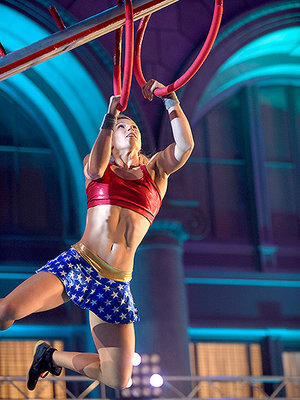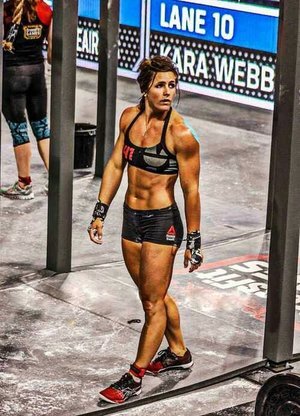Fitspiration vs. Thinspiration: What's the Deal & Have we overcome them?
Be forewarned, because I might soap box for a sec.
Health + fitness are a huge part of my life. And when it came to my "brand", it hadn't been a big part of what I shared, except for my workout dance parties on Instagram stories! 😉 So, my business coach and I started game planning. We wanted to take some professional photos that featured fitness prominently. And when we started considering what professional fitness photos I wanted, damn, I realized that I have some damn strong opinions. Primarily about thinspiration and fitspiration.
What is thinspiration...
Thinspiration is damaging as fuh. And there's a lot that I think qualifies. Anytime you have a "fitness" picture where a girl is just standing there, looking sexy, flexing and posing...that shit is thinspiration. And I hate it. Because for so many women, myself included, they look at that picture and see what they can't have. What they're not genetically gifted with. It feeds this notion of "not good enough". We see these people and we feel like we not only lost the genetic lottery, but we might as well have not shown up. Hate to be dramatic, but that's what it feels like. And that shit leads to depression or worse. And yet it's all over IG.
what is fitspiration...
But, fitspiration? That shit can be motivating. Fitspiration is when the person is putting in the work. She's not just posing. She's lifting weights, running, doing yoga. She's taking ACTION - not just standing there being sexy. That's the difference in my eyes. You look at these women and you know that this isn't just genetics. They've worked HARD to get where they are. They've grown. And damn do I have respect for the women who promote THAT. That's healthy. Because they show it’s not a gift. It takes work.
Are they actually different?
Some people say, emphatically, "No". That fitspiration and thinspiration are not different especially this article on Medium called "Fitspiration is just Thinspiration in Disguise." This author posts two pictures of women olympic weightlifters and says "No one can claim that they aren’t strong or healthy. But you’re not going to see them on Pinterest fitspiration boards." I beg to differ because I guess I know why that is. When you talk to an Olympic weightlifter or read an interview they've done, they often talk about their body as a tool and that the aesthetics of it matter a lot less to them. Their goal is to lift heavy shit and if there body allows them to do that, they love their body. These women have successfully been able to to pull themselves away from the cultural ideals that dictate what is and is not feminine beauty and I freaking applaud them for that. But not all women are so able to remove themselves from those ideals and for SO long culturally muscles on women weren't seen as attractive. They were seen as "manly". As such, women developed this ingrained fear of getting too bulky. So naturally, they often didn't aspire to looking like a weightlifter.
I don't know that that's true anymore. Because I do very much think that the landscape is changing. Perhaps the landscape is only changing in my life and perhaps this is because I'm exposing myself to different messaging and ideals of beauty. But I don't think that's true anymore. Because so many more women are realizing that lifting weight can actually GIVE them the physique they want, that curves and muscles are sexy. I mean shit, when you have typically skinny-promoting magazines writing articles about "Olympic-Style Weightlifting Women Who Make Lifting Heavy Shit Look Easy" and how you should follow these women on social media? I think that right there demonstrates how the landscape is changing. Hell, I think even the women that are showing up people's "fitness motivation Pinterest boards" are changing as well! Mattie Rogers, an Olympic Weightlifter went viral after smashing a barbell through a window and now has an insane social media following. The women of Crossfit, such as Brooke Wells, Katrin Davidsdottir, Annie Thorsdottir, Camille Leblanc-Bazinet, also have crazy social media followings and are anything but unhealthy role models for women. Jessie Graff of American Ninja Warrior is another example of a woman that women are totally aspiring to and she's a badass and totally a healthy role model. I just think that we need to give society some credit for the fact that fitness inspiration and the ideals of beauty and health ARE changing.
Instagram and many other social media sites seem to think that fitspiration and thinspiration are very different. In fact, when you search #thinspiration or #thinspo on Instagram, you get a warning, a disclaimer almost, about whether what you're searching for is healthy or harmful. This actually used to be the case with Pinterest as well, but I think that this has changed.
Social media is making the shift. Hashtags like #thinspiration or #thinspo? They only get like 50,000 hits on Instagram nowadays, while hashtags like #fitspiration, #fitspo and #bodygoals get millions upon millions of hits. Hell, even the hashtag #strongnotskinny gets more hits than #thinspiration or #thinspo combined. I'm not saying that's all good though. But there are changes that are happening and if anything, the terminology that is being used is getting better.
What does science have to say?
Scientific studies have even gotten in on the action. In just doing a quick Google search on thinspiration vs. fitspiration, both of which were published in the "Journal of Eating Disorders" (typical science - there is a journal of everything). And I actually found these two articles very interesting. One was called "A content analysis of thinspiration, fitspiration, and bonespiration imagery on social media" and did exactly what it said, comparing the image content found on 3 social media sites using the hashtags thinspiration, fitspiration, and bonespiration (I didn't even know that bonespiration was a thing). Ultimately, what they found was that thinspiration and bonespiration featured "thin and objectified bodies", while fitspiration contained "a greater prevalence of muscles and muscular bodies". Ultimately, they concluded that...
“The findings suggest fitspiration may be a less unhealthy type of content; however, a subgroup of imagery was identified which idealised the extremely thin body type and as such this content should also be approached with caution. Future research should utilise qualitative methods to further develop understandings of the body ideals that are constructed within these groups of content and the motivations behind posting this content.”
The other study agreed more with the via of the blogger mentioned above, stating that though the "Thinspiration sites featured more content related to losing weight or fat, praising thinness, showing a thin pose, and providing food guilt messages than Fitspiration sites", the "[fitspiration/thinspiration sites] did not differ on guilt-inducing messages regarding weight or the body, fat/weight stigmatization, the presence of objectifying phrases, and dieting/restraint messages. Overall, 88% of Thinspiration sites and 80% of Fitspiration sites contained one or more of the coded variables." So, we definitely still have a way to go.
What's the impact?
The impact of both of these is that they're based around comparison. Even the hashtags that DON'T get a bad rep, like #fitspiration, #fitspo and #bodygoals, are still promoting that comparison. And that's a problem. No matter who your fitness motivation is, using someone else's body as your ideal is never a healthy approach. They have a different physiology, a different body type, a different metabolism and ultimately just a different lifestyle. The Olympic weightlifters and Crossfit Athletes mentioned above? Their lives are FITNESS. Their lives are working out. They literally have like 4 coaches that are helping them to stay in peak condition. We can't compare ourselves to that shit! It's not even fair! And I think that's the thing that we need to remember...
Ultimately, that same article that criticized fitspiration above left with some redeeming advice that bears repeating: " As long as your goals are healthy, they’re made based on your own body and your lifestyle, and they don’t make you hate yourself, encouraging imagery can be a great tool. If you want to get to the gym more, and the posters help you do that, go for it. But remember that fitspiration should motivate you towards goals that you made, rather than making goals for you." That's the most important thing.
I've belabored this before in a previous post, but I think it's worth repeating here in the context of fitspiration imagery. If fitspiration serves as motivation, that's one thing and honestly, I feel like that's what fitspiration is good at. But I also think that motivation should be it's sole purpose. We should never be setting our goals around the imagery that we're using to motivate. Unless we've carefully curated that imagery to be a representation of body types that are achievable for us, fitspiration should never be what we deem as "body goals". Hell, #bodygoals in general should be as taboo as #thinspiration or #thinspo is. But that's a post for another time.
The bottom line is that social media can fuck with our heads in lots of ways. And I for one do not want to add to it. So, when I took and share my health + fitness pictures, I wanted to add to that healthy perception of body image. Fitspiration, not thinspiration. And if I am ever not true to that, please smack me upside the head. That’s not who I am or how I roll.
Those are my thoughts. What are yours? Drop a comment below to start a discussion!









